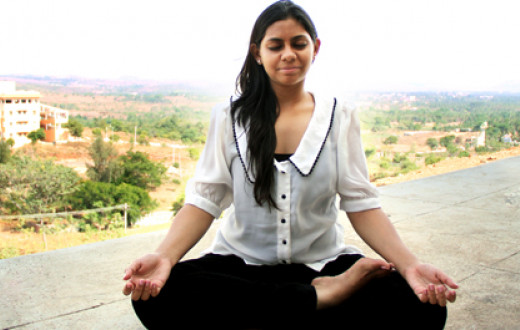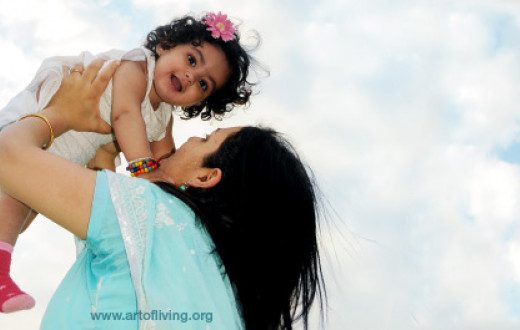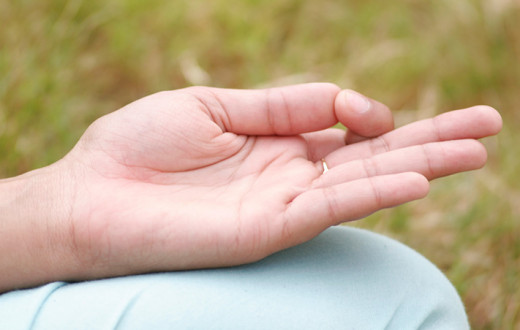Janette Scott learnt meditation as an adult but wants to share it with children so they can feel happier and healthier. She teaches the All ‘Round Training in Excellence program and is mother to a ten year old daughter. She has balanced the demands of full time work with family life and several community volunteer positions by doing her daily meditation and breathing practice. “It is what keeps me sane and maintains my energy” says Janette
What is meditation for children?
Meditation is about connecting with ourselves and others beyond the vacillations of the thinking mind. Babies are born in this state of awareness of the present moment without concepts, stories or thoughts about past and future. As they grow up, children develop a feeling of being self-conscious and shy and so anything to help them remember their natural state is an entry to meditation. This might include dancing or drawing or singing together to help them relax and focus. It brings a great feeling of peace, stillness and love. The things that cover the unique personality of a child are the stresses and pressures of life. Meditation helps to wipe away the dust that covers their innate beauty and creativity.
What inspires you to teach children?
I remember being a child myself and feeling lost in the world. It seemed so unfair that we are born without an instruction book on how to get along with others and how to feel confident. I watched other people and tried to model myself on my heroes from television. I thought that if I copied other people that I’d get along OK and be accepted. Deep down I always felt a lack in my life, that I wasn't good enough or I didn't really fit in. Now I feel very comfortable and happy with life. The Art of Living has given me wisdom and understanding– like the instruction book I was searching for as a child. Now I want to share this with children so they can grow up confident and happy.
What about the instruction book that you mentioned?
It is so great to share stories, games and activities with wisdom about life with children. On the ART Excel course we have five golden keys to help the children to understand how the mind works and to navigate relationships and difficulties. These keys to life are better than any instruction book I have found. The wisdom reminds children about the innate qualities of kindness, love and compassion that have become forgotten in the hurly burly of life. The games and stories give children the opportunity to put the knowledge into practice so it becomes very real for them.
Do you think children can meditate?
Yes definitely children can learn some simple techniques that allow them to be less anxious and more aware of themselves. Our innate nature is to be happy, playful and kind but these aspects become covered over by stress. Many children have to deal with tension, violence and the pressure to succeed within their own families as well so many external demands. These stresses all take a child away from his or her innate exuberance and naturalness. When children learn to relax and focus on their breath, the tension becomes less and their natural creativity and happiness returns. Then their awareness is on the present moment and meditation happens.
How about very young children and those who have tantrums and wont cooperate?
I have learnt so much in teaching children about how to harness their natural enthusiasm and to be creative in teaching meditation. Children can be very competitive and so one example is a game we play called ‘Dead Fish’. In the game, the children do something very active and physical and then they lie down completely still (like a dead fish). The first ones to move are out of the game and this encourages even the children having tantrums to drop the anger and join in because they want to win the game. The children get to experience being very still, and although it is a competition, we can then talk about how they felt and bring some self awareness.
Meditation is not only about sitting still though, you can also dance and play and introduce the experience via movement. For very young children, the most important influence is their parents. Tantrums will eventually pass but if parents learn to meditate and treat their children well then the tantrums stop more quickly. Very young children are already living in the present moment and they just need love and the freedom to express their creativity. The children help me to be centered and stable. They are pre-teenagers, coming to the stage of testing and checking the adults in their life so this challenges me to be honest with them.
Gurudev Sri Sri Ravi Shankar says that a lot of things are like riding a bicycle and teaching children is like that. You need to be fun and firm and that is the balance. Children can be very noisy and they need a lot of physical activity balanced with the ability to be still.
What are some of the tangible benefits you have seen?
On every course I have taught, a parent has commented about the changes they have seen in their child. We have seen a shy child participate with enthusiasm in a final skit demonstration, a brother who normally fights with his younger brother showing more kindness and so many examples of children being happy and making new friends.
What do you see available for these children who have done the course that children who haven’t learnt meditation won’t know?
Learning meditation and the wisdom available in the ART Excel course is like a seed that can be watered again and again throughout their life. The participants may not find their lives immediately transformed but they will have this resource to return to in times and difficulty. It is something I dearly wish was available when I was a child.
How can parents support their children?
The best thing that parents can do for their children is to be calm and centered themselves. A regular meditation practice helps them to respond appropriately and with less emotional re-activity than one who is angry, tired and stressed. Also if a child is told to do a meditation practice that they don’t see their parents doing, they will think why should I do that? Parents can sit with their children to meditate. If the parents have faith and believe that meditation is worthwhile then that will influence the child.
Life is so fast moving and there are so many pressures on families. How can meditation strengthen the bonds within a family?
With stress, families can get into a cycle of arguing, complaining and negativity and lose sight of the love and harmony that is underneath. When the stresses are reduced then the love that is there shines through and everyone feels happier and more content.
What is one thing parents can do to help their children?
Acknowledge & praise your children every day. We can be quick to criticize, but need to remember to uplift and tell our children how wonderful they are.























